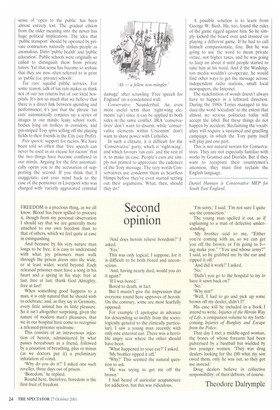Second opinion
FREEDOM is a precious thing, as we all know. Blood has been spilled to procure it, though from my personal observation I should say that we are generally more attached to our own freedom than to that of others, which we feel quite at ease in extinguishing.
And because by his very nature man longs to be free, it is easy to understand with what joy prisoners must walk through the prison doors into the wide, or at least wider, world beyond. Each released prisoner must have a song in his heart and a spring in his step: free at last, free at last, thank God Almighty, free at last!
When something good happens to a man, it is only natural that he should wish to celebrate: and, as they say in Germany, every little animal has its little pleasure. So it isn't altogether surprising, given the nature of modern man's pleasures, that we in our hospital have come to recognise a released-prisoner syndrome.
This consists of an intravenous injection of heroin, administered by what passes hereabouts as a friend, followed by a cessation of breathing, plus or minus (as we doctors put it) a preliminary inhalation of vomit.
'Why do you do it?' I asked one such reveller, three days out of prison.
'Boredom,' he replied.
Round here, therefore, boredom is the first fruit of freedom. 'And does heroin relieve boredom?' I asked.
'Yes.'
This was only logical, I suppose, for it is difficult to be both bored and unconscious.
'And, having nearly died, would you do it again?'
'If I was bored.'
Bored to death, in fact.
But I mustn't give the impression that everyone round here approves of heroin. On the contrary, some are most fearfully opposed.
For example (I apologise in advance for descending so swiftly from the sociologically general to the clinically particular), I saw a young man recently with only one external ear. There was a horrible angry scar where the other should have been.
'What happened to your ear?' I asked. 'My brother ripped it off.'
'Why?' This seemed the natural question to ask.
'He was trying to get me off the brown.'
I had heard of auricular acupuncture for addiction, but this was ridiculous. 'I'm sorry,'! said. 'I'm not sure I quite see the connection.'
The young man spelled it out, as if explaining to a man of defective understanding.
'My brother said to me, "Either you're coming with us, so we can get you off the brown, or I'm going to fing make you." "You and whose army?" I said, so he grabbed me by the ear and ripped it off.'
'And did it work?' I asked.
`No.'
'Didn't you go to the hospital to try to have it sewn back on?'
'No.'
'Why not?'
'Well, I had to go and pick up some brown off my dealer, didn't I?'
His case will be included in a book I intend to write, Injuries of the Heroin Way of Life, a companion volume to my forthcoming Injuries of Burglaly and Escape from the Police.
That day I met a middle-aged woman, the bones of whose forearm had been pulverised by a baseball bat wielded by two younger women. 'They was drug dealers looking for the £80 what my son owed them, only he was out, so they got me instead.'
Drug dealers believe in collective responsibility: of their debtors, of course.
Theodore Dalrymple










































































 Previous page
Previous page